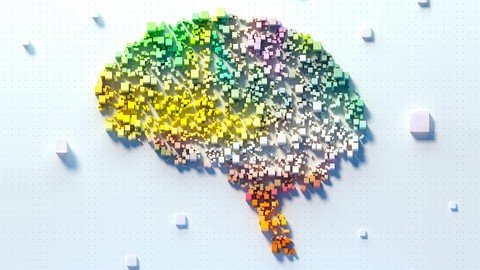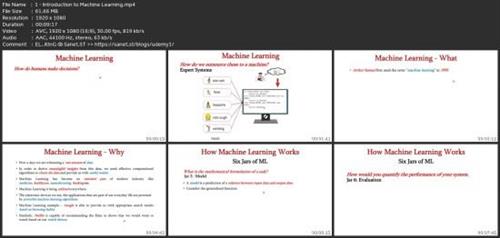- Thread Starter
- #1
Mastering Machine Learning: From Basics To Breakthroughs

Machine Learning, Supervised Learning, Unsupervised Learning, Regression, Classification, Clustering, Markov Models
What you'll learn
Explore the fundamental mathematical concepts of machine learning algorithms
Apply linear machine learning models to perform regression and classification
Utilize mixture models to group similar data items
Develop machine learning models for time-series data prediction
Design ensemble learning models using various machine learning algorithms
Requirements
Foundations of Mathematics and Algorithms
Description
This Machine Learning course offers a comprehensive introduction to the core concepts, algorithms, and techniques that form the foundation of modern machine learning. Designed to focus on theory rather than hands-on coding, the course covers essential topics such as supervised and unsupervised learning, regression, classification, clustering, and dimensionality reduction. Learners will explore how these algorithms work and gain a deep understanding of their applications across various domains.The course emphasizes theoretical knowledge, providing a solid grounding in critical concepts such as model evaluation, bias-variance trade-offs, overfitting, underfitting, and regularization. Additionally, it covers essential mathematical foundations like linear algebra, probability, statistics, and optimization techniques, ensuring learners are equipped to grasp the inner workings of machine learning models.Ideal for students, professionals, and enthusiasts with a basic understanding of mathematics and programming, this course is tailored for those looking to develop a strong conceptual understanding of machine learning without engaging in hands-on implementation. It serves as an excellent foundation for future learning and practical applications, enabling learners to assess model performance, interpret results, and understand the theoretical basis of machine learning solutions.By the end of the course, participants will be well-prepared to dive deeper into machine learning or apply their knowledge in data-driven fields, without requiring programming or software usage.
Overview
Section 1: Introduction
Lecture 1 Introduction to Machine Learning
Lecture 2 Types of Machine Learning
Lecture 3 Polynomial Curve Fitting
Lecture 4 Probability
Lecture 5 Total Probability, Bayes Rule and Conditional Independence
Lecture 6 Random Variables and Probability Distribution
Lecture 7 Expectation, Variance, Covariance and Quantiles
Section 2: Linear Models for Regression
Lecture 8 Maximum Likelihood Estimation
Lecture 9 Least Squares Method
Lecture 10 Robust Regression
Lecture 11 Ridge Regression
Lecture 12 Bayesian Linear Regression
Lecture 13 Linear models for classification: iscriminant Functions
iscriminant Functions
Lecture 14 Probabilistic Discriminative and Generative Models
Lecture 15 Logistic Regression
Lecture 16 Bayesian Logistic Regression
Lecture 17 Kernel Functions
Lecture 18 Kernel Trick
Lecture 19 Support Vector Machine
Section 3: Mixture Models and EM
Lecture 20 K-means clustering
Lecture 21 Mixtures of Gaussians
Lecture 22 EM for Gaussian Mixture Models
Lecture 23 PCA, Choosing the number of latent dimensions
Lecture 24 Hierarchial clustering
Students, data scientists and engineers seeking to solve data-driven problems through predictive modeling

rapidgator.net:
ddownload.com:

Published 9/2024
MP4 | Video: h264, 1920x1080 | Audio: AAC, 44.1 KHz
Language: English | Size: 918.11 MB | Duration: 3h 38m
MP4 | Video: h264, 1920x1080 | Audio: AAC, 44.1 KHz
Language: English | Size: 918.11 MB | Duration: 3h 38m
Machine Learning, Supervised Learning, Unsupervised Learning, Regression, Classification, Clustering, Markov Models
What you'll learn
Explore the fundamental mathematical concepts of machine learning algorithms
Apply linear machine learning models to perform regression and classification
Utilize mixture models to group similar data items
Develop machine learning models for time-series data prediction
Design ensemble learning models using various machine learning algorithms
Requirements
Foundations of Mathematics and Algorithms
Description
This Machine Learning course offers a comprehensive introduction to the core concepts, algorithms, and techniques that form the foundation of modern machine learning. Designed to focus on theory rather than hands-on coding, the course covers essential topics such as supervised and unsupervised learning, regression, classification, clustering, and dimensionality reduction. Learners will explore how these algorithms work and gain a deep understanding of their applications across various domains.The course emphasizes theoretical knowledge, providing a solid grounding in critical concepts such as model evaluation, bias-variance trade-offs, overfitting, underfitting, and regularization. Additionally, it covers essential mathematical foundations like linear algebra, probability, statistics, and optimization techniques, ensuring learners are equipped to grasp the inner workings of machine learning models.Ideal for students, professionals, and enthusiasts with a basic understanding of mathematics and programming, this course is tailored for those looking to develop a strong conceptual understanding of machine learning without engaging in hands-on implementation. It serves as an excellent foundation for future learning and practical applications, enabling learners to assess model performance, interpret results, and understand the theoretical basis of machine learning solutions.By the end of the course, participants will be well-prepared to dive deeper into machine learning or apply their knowledge in data-driven fields, without requiring programming or software usage.
Overview
Section 1: Introduction
Lecture 1 Introduction to Machine Learning
Lecture 2 Types of Machine Learning
Lecture 3 Polynomial Curve Fitting
Lecture 4 Probability
Lecture 5 Total Probability, Bayes Rule and Conditional Independence
Lecture 6 Random Variables and Probability Distribution
Lecture 7 Expectation, Variance, Covariance and Quantiles
Section 2: Linear Models for Regression
Lecture 8 Maximum Likelihood Estimation
Lecture 9 Least Squares Method
Lecture 10 Robust Regression
Lecture 11 Ridge Regression
Lecture 12 Bayesian Linear Regression
Lecture 13 Linear models for classification:
Lecture 14 Probabilistic Discriminative and Generative Models
Lecture 15 Logistic Regression
Lecture 16 Bayesian Logistic Regression
Lecture 17 Kernel Functions
Lecture 18 Kernel Trick
Lecture 19 Support Vector Machine
Section 3: Mixture Models and EM
Lecture 20 K-means clustering
Lecture 21 Mixtures of Gaussians
Lecture 22 EM for Gaussian Mixture Models
Lecture 23 PCA, Choosing the number of latent dimensions
Lecture 24 Hierarchial clustering
Students, data scientists and engineers seeking to solve data-driven problems through predictive modeling
Screenshots

rapidgator.net:
You must reply in thread to view hidden text.
ddownload.com:
You must reply in thread to view hidden text.
